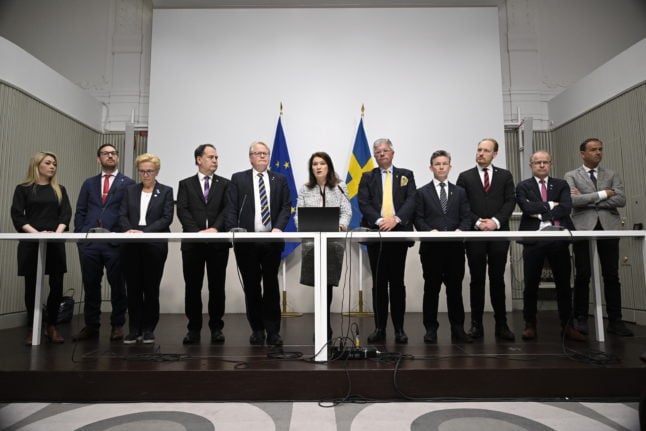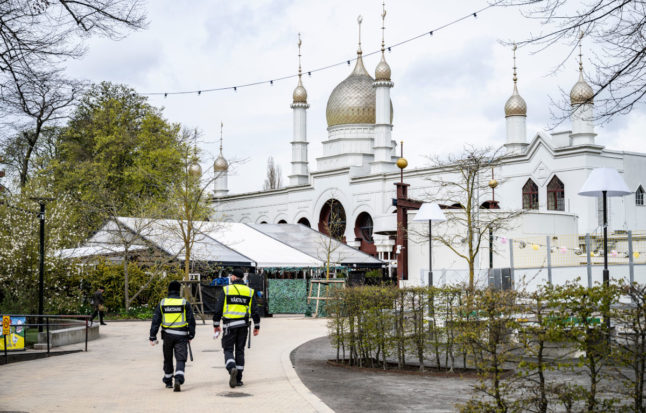Presenting the results of the analysis (here in English) at a press conference at 11am on Friday, Sweden’s foreign minister, Ann Linde, said that a Swedish Nato membership would “raise the threshold for military conflict in Europe”.
“The foremost consequence of a future membership in Nato is that Sweden would be a part of Nato’s collective security and as a result have a conflict-dampening effect in Europe,” she said.
Defence Minister Peter Hultqvist added that Nato membership would make the response of Sweden’s allies more predictable.
“With a future Swedish Nato membership, the uncertainty which there is currently over what behaviour would be seen in a security crisis or armed attack would be reduced,” he said.
The group, which was formed on March 16th, shortly before Easter, and met six times, was led by Linde, and included Hultqvist together with appointees from all of Sweden’s eight parliamentary parties. The report, while making strong arguments in favour of Nato membership for Sweden, makes no explicit recommendation that Sweden should apply to join the 30-country alliance.
Neither Linde nor Hultqvist were willing to state their own positions on whether Sweden should join, arguing that as ministers representing the Social Democrats, they needed to wait until the party officially changes its position to favour membership at a meeting of its ruling committee on Sunday.
“Of course, it’s the case that after this extremely thorough work, that I’m clear about my own opinion,” Linde said. “But out of respect for our party discussion and for the government’s decision which will come soon, I am choosing not to say what I think for now.”
Hans Wallmark, foreign policy spokesperson for the pro-Nato Moderate Party, said, however that in his opinion the conclusion of the report was clear.
“We share the conclusions made yesterday by Finland’s president and prime minister,” he said. “We must now immediately apply for Nato membership. Full stop.”
The report argues that Russia’s military aggression is not a short-term problem, but instead means a “structural and long-term deterioration in the security situation in Europe”, making it “necessary to make an assessment of how Sweden’s security can be guaranteed in the best way”.
It also argues that despite the increased military interoperability with Sweden’s partners, there was “no guarantee that Sweden will get help if a serious threat or attack was directed at the country that was not within the boundaries of current cooperation”.
It argues that a bilateral approach was “not a realistic alternative” and that there was a “lack of political will” within the EU to build a system of mutual defence, while the attack on Ukraine had shown the limits of the help Nato will give to non-member countries.
“A Swedish Nato membership would raise the threshold for military conflict and as a result have a conflict-preventing effect in northern Europe,” the paper concludes.
“If both Sweden and Finland join Nato, then all of the Nordic and Baltic countries would be covered by an obligation of mutual defence. The uncertainty which there is currently over what behaviour would be seen in a security crisis or armed attack would be reduced.”
The representatives from the Green Party and Left Party, which both oppose Nato membership, refused to back the conclusions of the report, giving their approval only to the first four chapters laying out the changed threat situation.
In the press conference, Håkan Svenneling, an MP from the Left Party, complained that the report barely mentioned any of the risks that would come with Nato membership.
“You have to look with a microscope to find any of the arguments against Nato membership,” he complained, dismissing the report as “a pamphlet in favour of Swedish Nato membership”.
The report does, however, push back at one of the key arguments of Nato opponents, arguing that membership of the alliance would not impact on Sweden’s goal of progressive nuclear disarmament.
“A Nato-membership would not decrease Sweden’s opportunities to pursue our values internationally, including for nuclear disarmament,” the report reads.
It also concludes that while Russia will express its unhappiness at Sweden and Finland joining Nato, and may respond with non-military measures, it is unlikely to mount a military attack on Sweden.



 Please whitelist us to continue reading.
Please whitelist us to continue reading.
How on earth could possibly Sweden joining NATO increase the safety of Europe as a whole and of Sweden in particular??? Sweden has been out of Nato fo up to 70 years since Nato itself was created soon after the end of WWII, and never ever Sweden was in danger of an invasion from The Soviet Union, why should it be worried NOW? On the contrary, Russia has EXPLICITELY said that Sweden and Finland joining Nato is seen as an aggresive move, and will be opposed by Russian counter-meaures! Is there any more tangible proof??? Evidently, the new Swedish government is moving along following an agenda that is more and more dictated by the USA, and Nato, more than by their own people’s real interests and safety!
Turkey says it opposes Sweden and Finland and will Veto membership for these two pawns of the United States . HA HA HA .